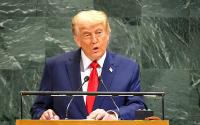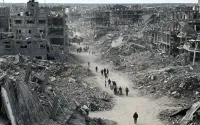26 September 2004truhtout
Iraq's interim prime minister, Ayad Allawi, acknowledges that those elections he and President Bush have vowed would take place next January "may not be perfect.'' Defense Secretary Donald Rumsfeld acknowledges that they may not be held at all in 20 to 25 percent of Iraq because of continuing violence. Meanwhile, as The Times's Dexter Filkins reports from Baghdad, Iraq's most influential cleric, Grand Ayatollah Ali al-Sistani, is increasingly concerned that even where voting does take place, the choices will be rigged in advance in ways that underrepresent the country's Shiite majority and thwart democratic choice.
These are far from trivial issues, despite Mr. Rumsfeld's curiously undemocratic remark that if some substantial portion of Iraqis cannot vote, "so be it." With the original rationales for the Iraq war now discredited and with a spreading insurgency killing scores of American soldiers and hundreds of Iraqi civilians every month, the prospect of holding democratically legitimate elections in January is about the only thing the Bush administration could hope for as a sign of eventual success.
Yet the six political parties that Washington has promoted all along are not making that any easier. These parties, which are rooted among the exiles who left Iraq during the Hussein era and lack broad popular support, are now discussing a plan to run as a single unified ticket rather than competing among themselves on the ballot. That could create essentially a one-party election unless Iraq's fragmented independents manage to organize themselves into an effective new political force. Otherwise, Iraq's first free election may look uncomfortably like the plebiscites choreographed to produce 98 percent majorities for Saddam Hussein.
Had the American occupation not worn out its welcome so fast and so thoroughly, there would be a good argument for delaying those elections until more representative and competitive political parties could organize themselves and conditions became more secure. But as things now stand, any postponement would probably make matters even worse. Washington and Mr. Allawi's appointed government have fallen under a Catch-22: the only hope of quelling the insurgency depends on progress toward democratic government and the only hope of meaningful elections depends on greater progress in quelling the insurgency.
The best thing the administration can do now is to salvage as much legitimacy as possible for the elections. Ayatollah Sistani's biggest concern is that a unified slate would effectively parcel out seats in the new assembly in backroom deals before any votes are cast, using a formula that he feels would give the Shiites fewer seats in the new assembly than they are entitled to based on their present share of the Iraqi population. That would be less likely to happen if the parties agreed to compete against each other at the polls, letting the voters themselves decide how many seats to give to each party.
Building legitimacy for the elections in the Sunni areas will be considerably harder. Some of these areas are not now under government control, and, even if they are by January, they may be in no condition for a free vote. Even the more peaceful Sunni regions do not feel adequately represented by any of the six main parties: two Kurdish, two Shiite and two nonsectarian. It is imperative that Baghdad, with help from the United Nations, use the next four months to try to bring new elements from these areas into the political arena.
If the elections cannot be held in much of the Sunni heartland and are boycotted elsewhere by Sunnis and Shiite followers of Ayatollah Sistani, the prospects for holding Iraq together, let alone creating enough stability to withdraw American troops anytime soon, would turn desperately bleak.






